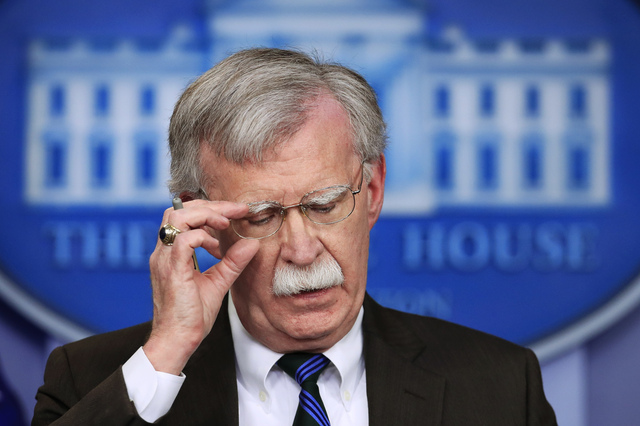 |
|
Former White House National Security Advisor John Bolton, who resigned on Sept. 10.
|
Trump posts tweet that Bolton’s “services no longer needed at the White House”
On Sept. 10, US President Donald Trump suddenly dismissed White House National Security Advisor John Bolton, with whom he’d long clashed on foreign policy. The departure of the bellicose Bolton, known for being a virulent hawk, is likely to reinforce Trump’s signature “America first” policy, which prefers financial gain to military action. The move could also have an impact on North Korea-US dialogue, given the increasing likelihood of working-level talks resuming. “I informed John Bolton last night that his services are no longer needed at the White House. [. . .] I asked John for his resignation, which was given to me this morning,” Trump said on a tweet on Sept. 10. “I disagreed strongly with many of his suggestions, as did others in the Administration,” Trump said, explaining why he’d asked Bolton for his resignation, adding, “I thank John very much for his service. I will be naming a new National Security Advisor next week.” White House spokesperson Hogan Gidley told reporters that Charles Kupperman, Bolton’s deputy, would serve as the acting national security advisor. Bolton had been scheduled to hold a joint briefing with US Secretary of State Mike Pompeo and US Treasury Secretary Steven Mnuchin about Trump’s latest executive order at 1:30 pm on Tuesday, just one hour after Trump announced his termination. Thus, Trump’s firing of Bolton on Twitter came as quite a surprise. But since there’s been considerable discord in the US government over Bolton’s hardline stance, the response by key advisors suggests his dismissal wasn’t wholly unexpected. During the briefing about Trump’s executive order, Pompeo was asked by reporters whether Bolton’s resignation would make it easier to do his job. “We all give our candid opinions [to Trump]. There were many times Ambassador Bolton and I disagreed; that’s to be sure,” Pompeo said in response. When the reporter asked if Pompeo had known that Bolton would be resigning, Pompeo said, “I’m never surprised,” prompting laughter from the audience, as well as from Mnuchin, the Treasury Secretary, who was also on the podium. Some analysts think Bolton finally lost his battle for power with Pompeo; in recent months, the two officials reportedly didn’t speak unless they were at official meetings. Bolton’s views had been at odds with Trump’s on issues including Afghanistan, Venezuela, Iran, and North Korea. Bolton had opposed Trump’s push to pull US troops out of Afghanistan and was almost left out of a meeting about the troop withdrawal, making a belated arrival. Trump reportedly became disappointed in Bolton after the failure of an American attempt to force regime change in Venezuela this spring. Bolton also differed with Trump in his calls for a military attack on Iran. After Bolton provoked North Korea by remarking that Libya could serve as a model for North Korea’s nuclear dismantlement last year, Trump stepped in to say that the US isn’t pursuing the Libya model. While Trump hasn’t taken issue with North Korea’s recent string of short-range missile test launches, on the grounds that they’re not long-range missiles, Bolton has taken a more aggressive stance, decrying them as a violation of UN sanctions on North Korea. NBC reported that Trump placed several calls to Bolton’s predecessor, H.R. McMaster, since last fall, asking for his advice on a range of policies and telling McMaster that he missed him. While Trump had thought having a hardliner like Bolton around would give him more leverage overseas, Trump’s frustration about the man evidently became too much to bear. Bolton’s influence in White House had already eroded before his departure The big question is what direction US foreign policy will move in after Bolton. The tough stance Bolton advocated, including a willingness to countenance military action, is sure to lose steam. Since an even tougher hardliner is unlikely to replace him, US foreign policy is expected to undergo considerable change. But since Bolton’s influence at the White House had already eroded considerably, some think his departure won’t bring any major alterations. “I don’t think any leader around the world should make any assumption that because some one of us departs, that President Trump’s foreign policy will change in a material way,” Pompeo told reporters on Tuesday. As of late, Bolton had also played less of a role in North Korea-US dialogue. Bolton was reportedly responsible for the lack of a deal in the Hanoi summit between Trump and North Korean leader Kim Jong-un this past February, having fed Trump the case for demanding an all-in-one agreement. But Bolton didn’t accompany Trump on his meeting with Kim at Panmunjom in late June, visiting Mongolia instead. Bolton’s resignation may be positive signal for North Korea-US dialogue Bolton’s departure may well be a positive factor for restarting North Korea-US dialogue. After all, it clears away one of the figures that North Korea has described as an obstacle to dialogue with the US, alongside Pompeo. “North Korea will regard Bolton’s dismissal as an opportunity to reengage with the US in the hopes of being offered a better deal than it was at Hanoi. That makes it more likely that North Korea will return to dialogue in late September, as North Korean Foreign Minister Choe Son-hui proposed,” Frank Aum, a senior expert at the United States Institute of Peace, told the Hankyoreh. Bolton himself tweeted on Tuesday that “I offered to resign last night and President Trump said, ‘Let's talk about it tomorrow.’” In a text message sent to the Washington Post, Bolton said he would speak up when the time was right but insisted that he’d told the truth. Bolton added that his only concern was the US’ national security. Bolton claims that he left of his own volition, rather than being forced out. By Hwang Joon-bum, Washington correspondent Please direct comments or questions to [english@hani.co.kr]






